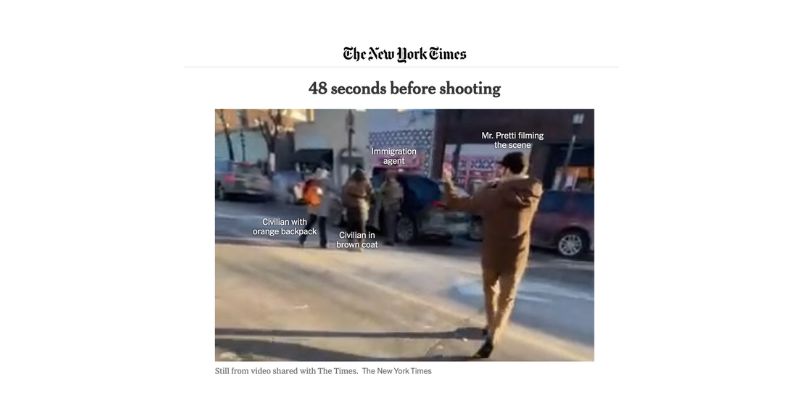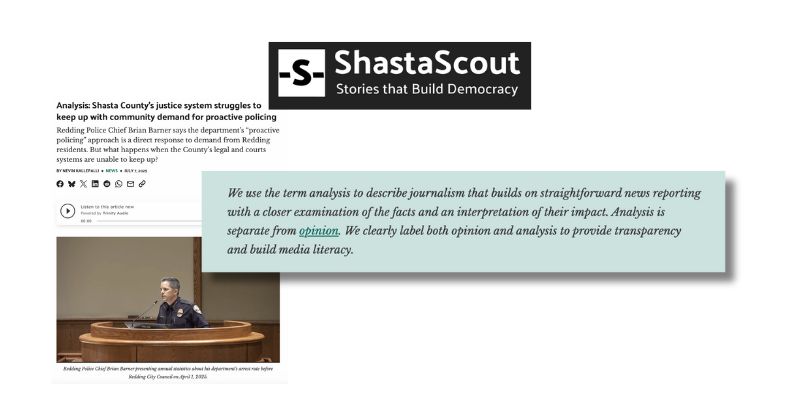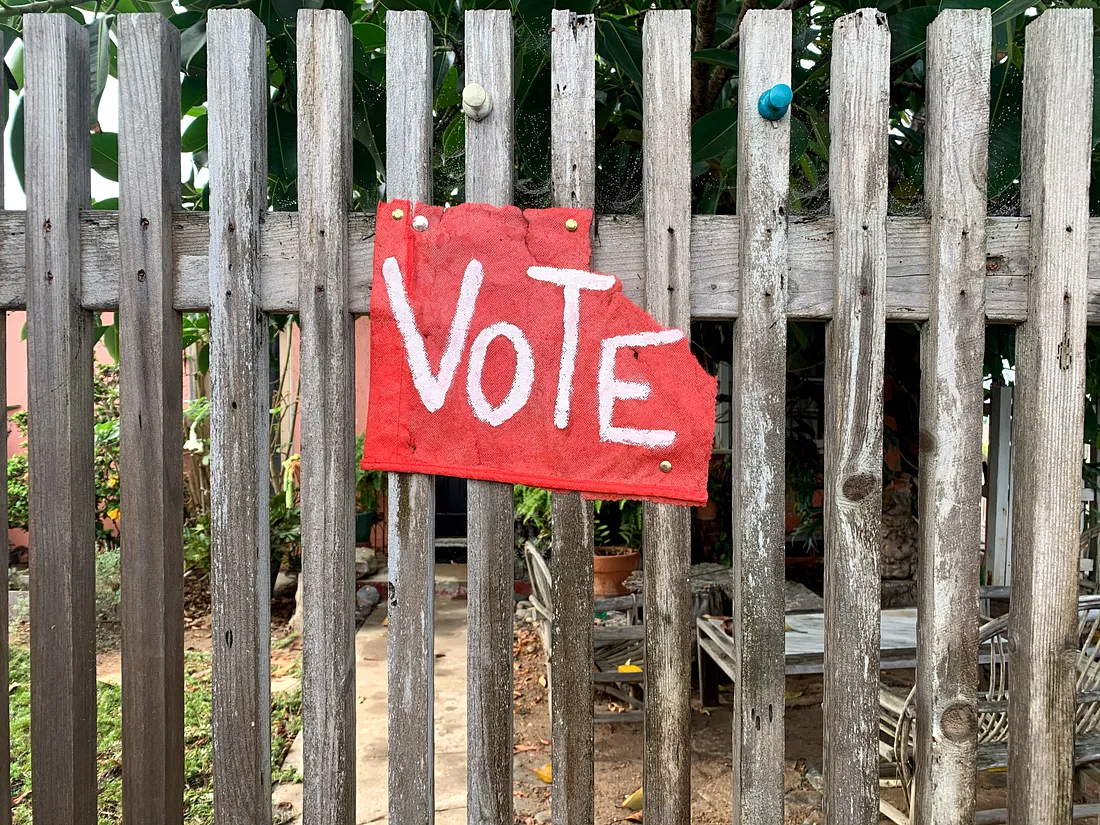
Instead of keeping all of your election planning and decision-making internal, share what you are doing publicly. Explain the focus of your stories, discuss what issues and races you are prioritizing and why, and talk about the goals of your overall coverage.
Define and share your mission for covering the election
This post will continue to be updated with new examples.
Does your audience know about your goals for election coverage? Or, like so much of journalism’s internal deliberations, is your purpose invisible to outsiders?
At Trusting News we find a lot of newsrooms have a strategy for covering an election. Often, newsrooms hold meetings months in advance to plan out their coverage. During those meetings, they are making decisions about what topics they will focus on, what races they will focus on and what their overall coverage is going to look like. Throughout those discussions, they make decisions about how to be fair and how to be ethical.
For each election, a team of journalists will go through this process, but often, this process, these decisions and the overall goals of their coverage are not shared with their communities. Instead, the reporting moves forward and journalists are often left fielding comments from users accusing them and their coverage of being biased, being unfair, pushing an agenda or perpetuating “fake news.”
If this sounds familiar, we challenge you to try something different:Instead of keeping all of your planning and decision-making internal, share what you are doing publicly. Explain the focus of your stories, discuss what issues and races you are prioritizing and why, and talk about the goals of your overall coverage.
Create a mission statement for your election coverage
You probably have a mission statement for your newsroom. (If you don’t we have tips on creating one and how to make it public here.) Organizational mission statements share the values of a news organization. They should go beyond “holding the powerful accountable” or “finding the truth” and should include specifics about how you select which stories to cover and what you invest your resources in.
A mission statement for your election coverage is similar, but instead of focusing on your entire coverage, it only focuses on your election or political coverage. It should address how you cover races, politicians, voting and even democracy.
A few key elements a mission statement for your election coverage should include:
- Your why: You want it to include the reasons you do what you do. This could address questions like: Why are you covering (or not covering) specific races? Why are you focusing on certain issues? Why are you paying close attention to voter registration? Why is covering elections important to you?
- Your who: Who are the reporters covering the election? How can people get in touch with them? What is their experience that lends credibility to the reporting?
- Your how: It should include the way you conduct your work and accomplish the goals you laid out. Explain how you will cover the races and politicians. What kind of information will you be reviewing and gathering? What sources do you trust? How will you ask candidates questions? If people do not respond to you, how will you handle that?
- The what: This is the actual thing you do. Where can people find your election coverage? How can they stay up to date on the latest news about the election? Where will you be posting updates? How often will you be updating your reporting?
If you want to go even further and add more transparency you could:
- Discuss conflicts of interest and how your staff avoids them or handles them.
- Address complaints of bias and having an agenda directly by discussing how you work to be fair and what it means to be independent.
- Provide an easy way for community members to contact you and/or ask questions about the election.
Remember that with all of this, you want to tie it back to the community. you can highlight all of the work you do, you don’t want it to sound self-serving. The goal isn’t to make yourself look impressive. At the end of the day, the reason you do all of this information gathering and fact-checking is for the public. Be sure to tie back all of the work to that point.
Mission statements for your election coverage are also a great tool to:
- Hold your newsroom accountable (internally and externally) because you are on the record about what you aim to achieve
- Shine a light on your values, ethics and goals
- Help the newsroom respond to comments from the community (because you’ve already articulated what you want people to know)
- Keep your coverage consistent and tied to goals
Mission statements from Democracy SOS newsrooms
Trusting News, along with The Solutions Journalism Network and Hearken, is working with journalists to help them cover elections differently through the Democracy SOS program. The nine-month fellowship supports reporters and editors in significantly strengthening journalism’s role in advancing our democracy through innovative approaches that build civic engagement, equity and healthy discourse.
During the training program, we have challenged each newsroom to publish a mission statement about their election coverage. Continue reading below to see examples of the mission statements as well as highlights of elements we see as being particularly helpful and useful for users. (We are continuing to add to this list as newsrooms publish their mission statements).
WyoFile
WyoFile created an Election 2022 page where they clearly lay out their mission. One of my favorite elements is how they made a bulleted list of what they will do. In the list, they get pretty specific. They talk about covering forums and debates, investigating big campaign donors and following how redistricting impacts state races.

WyoFile then shared more insight about its election coverage in an email newsletter to members. In it, they asked for feedback from their members, including asking them what questions they have about the organization’s election mission. When asking for feedback they also individually name who the reporters are focusing on this coverage.

Not only did the newsletter update the members on WyoFile’s election mission and ask for feedback, it also talked about how they are on the lookout for bias in their reporting and discussed how people can submit a correction.

Charlottesville Tomorrow
Charlottesville Tomorrow included its mission on its 2022 Voter Guide page. In talking about its mission, they got specific about what this election means and added details about what areas the congressional districts cover. That detail about where a congressional district exists is a great way to provide more context for voters so they can better understand your reporting and its impact on their lives.

WUSF
WUSF included its election mission statement in a shaded box alongside its Democracy 2022 coverage page. An element that is particularly good is their mention of their journalists being “independent, curious, respectful and accountable.” The news organization also produced a one-minute audio story that explains its focus for its election coverage and reinforces its mission statement. The audio explainer is airing throughout the day during different shows.

WITF
WITF highlights its commitment to Democracy in its election mission statement included on its election page. They get straight to the point and say, “WITF’s political coverage will be biased toward two things: Democracy and facts.” The election page also include helpful tips on how to recognize misinformation and disinformation as well as easy ways to check voter registration and how to register to vote.
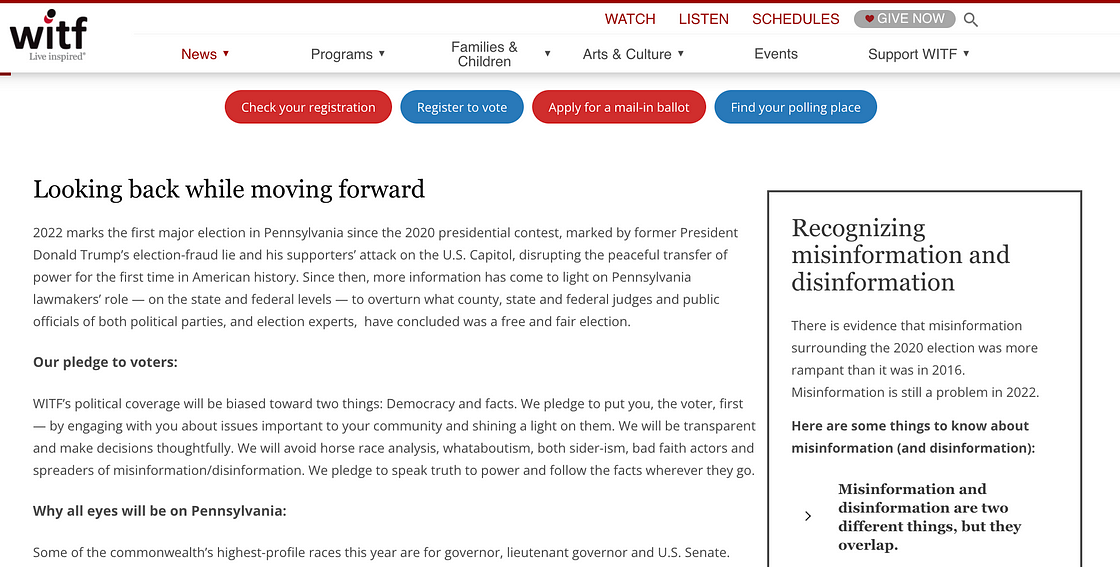
The Nevada Independent
The Nevada Independent gets specific about what “independent” reporting on the election means in its election mission statement. They explain that independent means diving deep into policy issues in a clear and easy-to-understand manner.
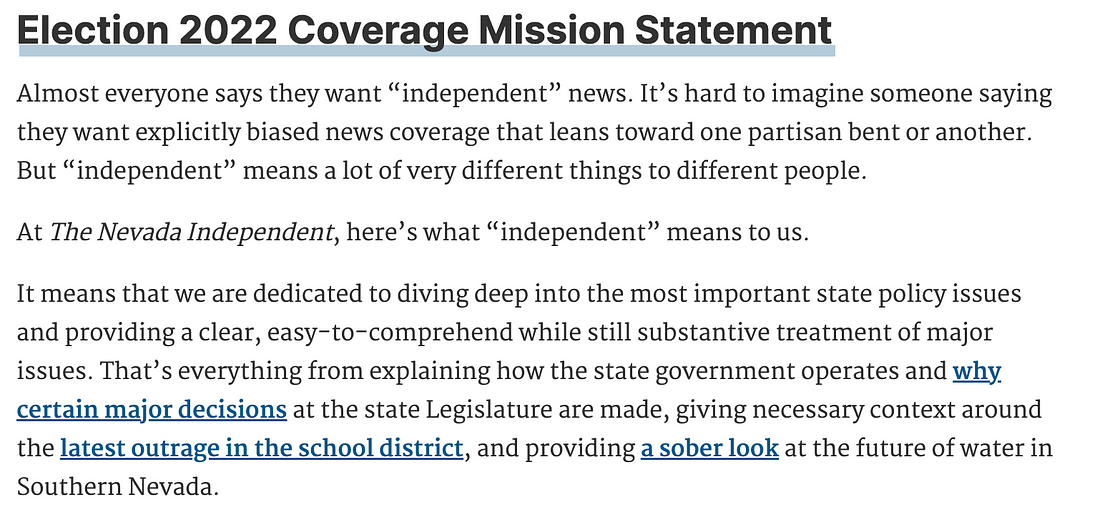
The Texas Tribune
The Texas Tribune created a page explaining how the staff plans to approach the 2022 election. The page starts with their goal explained in one sentence: The Texas Tribune’s coverage of elections seeks to empower informed participation in our democracy.
The page then outlines how it will achieve this goal by explaining how its journalists will explain voting, how they will hold politicians accountable, how they choose which races to cover, how they cover misinformation and how readers will inform their work.
One element that stands out is a box with clickable links to each of those topics. In addition, each of the topic headers has a link icon. When users click on it, it copies the URL to that particular section so it can be easily shared and direct people to a specific topic on the page.
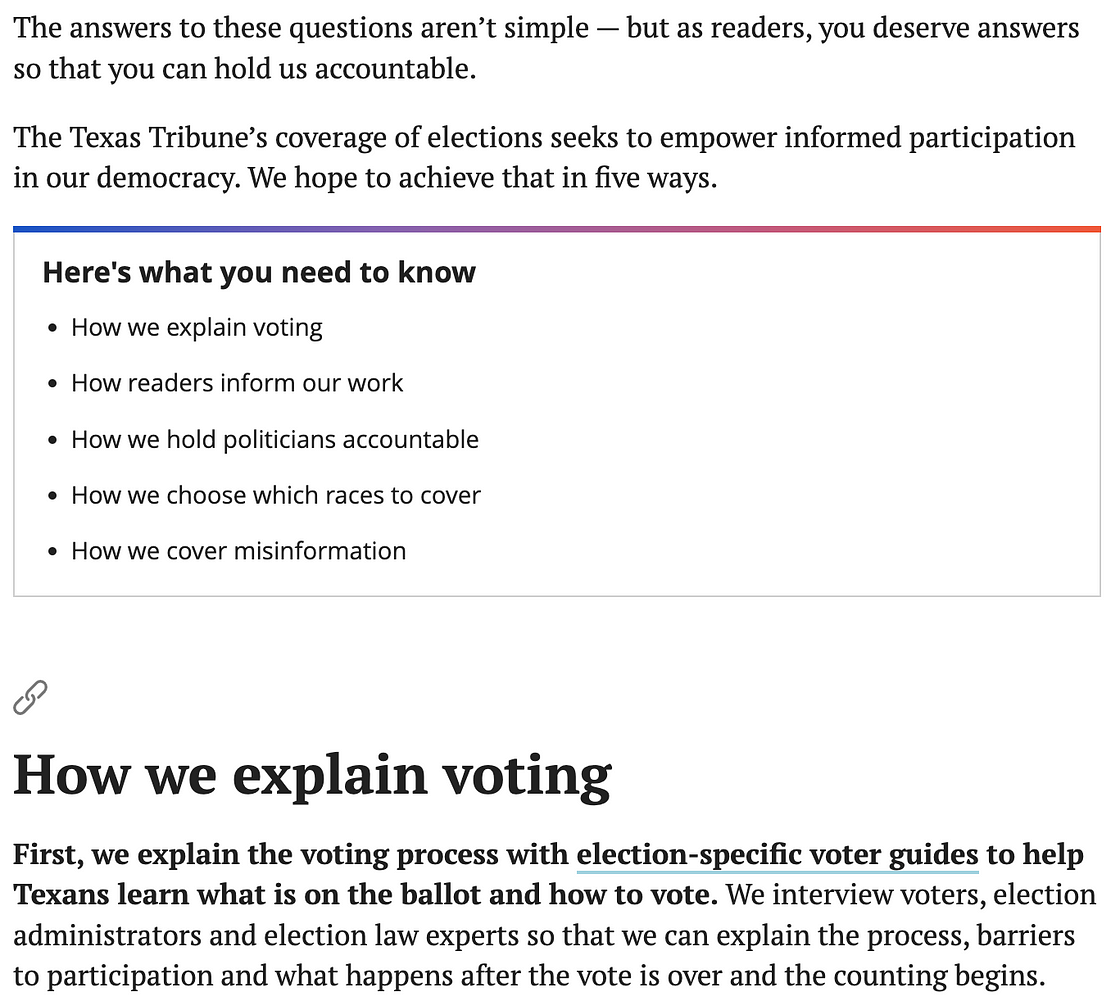
At the end of the page, they ask their users what they are missing and what questions people have about the upcoming election cycle.
What’s missing in this? How does this align with what you see in our coverage? What questions does this leave you with? What issues do you most care about going into this election cycle and what questions do you have about voting? We’d love to hear from you — send us a note at community@texastribune.org or fill out our online form here.
New Hampshire Latino News
In a story announcing a community conversation about the upcoming election, New Hampshire Latino News shared its mission for covering the election.
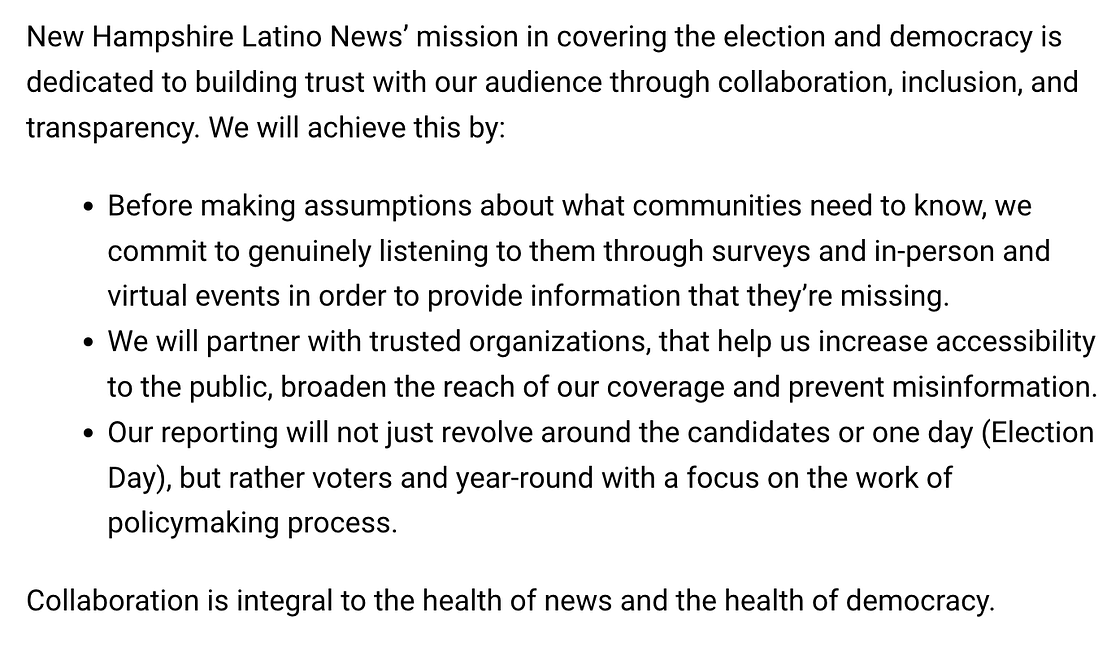
In it, they highlight their commitment to collaboration and listening. The news organization also embedded a survey in the post, asking the community about whether or not they are registered to vote, what might be preventing voter registration and where they get information about local issues.
At Trusting News, we learn how people decide what news to trust and turn that knowledge into actionable strategies for journalists. We train and empower journalists to take responsibility for demonstrating credibility and actively earning trust through transparency and engagement. Subscribe to our Trust Tips newsletter. Follow us on Twitter and LinkedIn. Read more about our work at TrustingNews.org.

Assistant director Lynn Walsh (she/her) is an Emmy award-winning journalist who has worked in investigative journalism at the national level and locally in California, Ohio, Texas and Florida. She is the former Ethics Chair for the Society of Professional Journalists and a past national president for the organization. Based in San Diego, Lynn is also an adjunct professor and freelance journalist. She can be reached at lynn@TrustingNews.org and on Twitter @lwalsh.

